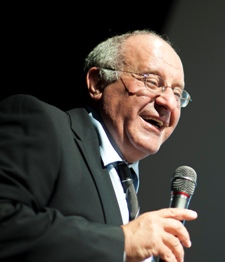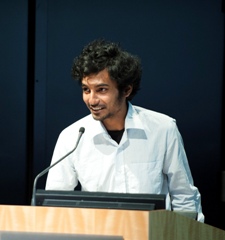Shannon Memorial Lecture Showcases Award-Winning Information Theory Research
San Diego, Calif., May 16, 2012 — Shlomo Shamai, professor of Electrical Engineering (EE) and Statistics at the Technion — Israel Institute of Technology, presented UC San Diego’s 10th annual Claude E. Shannon Memorial Lecture at the California Institute for Telecommunications and Information Technology (Calit2) Auditorium last week before an assembly of students, faculty and members of the community.
|
Shamai is the recipient of the 2011 Claude E. Shannon Award, which is presented each year by the Institute of Electrical and Electronics Engineers (IEEE) Information Theory Society. Shamai is also a fellow of IEEE and the recipient of the 1999 van der Pol Gold Medal of the Union Radio Scientifique Internationale (URSI), as well as several other prestigious awards. He was asked to present the Shannon Memorial Lecture by the UCSD Center for Magnetic Recording Research (CMRR) with support from Calit2 and its Information Theory and Applications Center (ITA).
Noting that Shamai has authored more than 400 papers for IEEE Explore alone, Professor Paul Siegel of CMRR joked at the event that when he has a research question, instead of consulting Wikipedia or Scholarpedia, he wishes he could consult “Schlomopedia, because he has such a vast knowledge about information theory.”
Information theory is a branch of applied mathematics and electrical engineering that seeks to quantify information. Shannon was a forerunner of the field, which has since broadened from its emphasis on signal processing to include applications in various forms of data analysis, such as statistical inference, cryptography and quantum computing.
Shamai’s lecture addressed the Guassian interference channel, which statistically models signal interference when multiple users (such as multiple cell phone users) compete for shared resources on the same communication channel. By knowing the degree and the nature of such interference or 'noise,' service providers can ultimately prevent or limit it from disrupting signals.
|
Also honored at the event was EE Ph.D. candidate Jayadev Acharya, who beat out two other finalists from UC San Diego to win the Shannon Graduate Fellowship. Acharya was selected for his work in three separate areas pertaining to EE: applying algebraic methods to DNA sequencing (a topic that also earned him the International Symposium Information Theory student paper award); compressing large-alphabet data (such as data originating from the Chinese alphabet); and data classification and machine learning (such as teaching a machine if an incoming email is spam or not spam).
Says Acharya, “I like to think of the second and third projects as being a part of a bigger goal of understanding the limits of learnability with a given amount of data and designing algorithms that achieve these limits.
“Although I’m very happy and feel honored to receive this award, there are many people who have worked before me whom I must acknowledge, including my group members, previous and current. I would also like to thank (my advisor) Prof. Alon Orlitsky for giving me the freedom to work on whatever problems I want, and for being there at every step to guide me in the right direction.”
Orlitsky, for his part, calls Acharya “brilliant, very creative and technically superb.”
“Jayadev is unique in that he’s worked on three different topics throughout his research career,” Orlitsky adds, “and in each he has done an amazing job.”
Related Links
Center for Magnetic Recording Research
Information Theory and Applications
Media Contacts
Tiffany Fox, (858) 246-0353, tfox@ucsd.edu


